Faculty Excellence Awards
Research, Scholarship, and Creative Activity
Awards are given annually: one for a probationary faculty (tenure-track) and one for a tenured faculty (at the associate or professor level). Recipients receive money in support of their scholarship and are selected based on: (1) exceptional promise for significant research achievement; outstanding capability to publish in quality venues and secure grants/awards for probationary faculty or (2) continuous record of research activity; quality of publishing venues; grants/awards; and national and international impact and reputation for tenured faculty.
Tenured Faculty Award
Pierre Asselin, Department of History
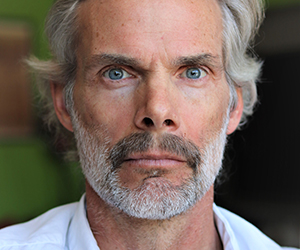
Originally from Québec City, Canada, Pierre Asselin holds the Dwight E. Stanford Chair in U.S. Foreign Relations in the Department of History at SDSU. He has a bachelor’s degree from Glendon College (Canada), a master’s degree from the University of Toronto, and a Ph.D. from the University of Hawaii at Manoa.
He is a leading authority on the Vietnam War, a subject that has fascinated him ever since he watched Sylvester Stallone’s “Rambo: First Blood Part II” in high school. Asselin is particularly interested in the decision-making of Vietnamese communist authorities in the period 1945-75. He speaks Vietnamese and annually travels to Hanoi for research. His interest in internationalism and transnationalism during the Vietnam War has taken him to a variety of document repositories, including the Algerian National Archives.
Asselin is the author of “A Bitter Peace: Washington, Hanoi, and the Making of the Paris Agreement” (UNC Press, 2002), “Hanoi’s Road to the Vietnam War, 1954-1965” (UC Press, 2013), and “Vietnam’s American War: A History” (Cambridge UP, 2018). An extensively revised and expanded second edition of the latter book appeared in 2024. “Vietnam’s American War: A New History” has become a staple text in university-level courses addressing the conflict; The American Historical Review recently praised its contribution to decolonizing Vietnam War syllabi. Asselin is also editor of “The Cambridge History of the Vietnam War, Volume III: Endings and Aftermaths” (Cambridge UP, 2025). His latest article, “National Liberation by Other Means: US Visitor Diplomacy in the Vietnam War,” appeared in Past & Present in August 2024.
Asselin is the guardian of three cats.
Tenure-Track Faculty Award
Kristal Bivona, Department of Classics and Humanities
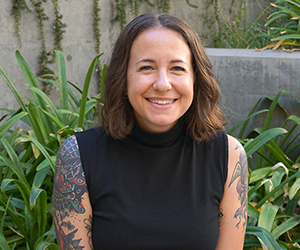
Kristal Bivona is assistant professor in the Department of Classics and Humanities and associate director of the Behner Stiefel Center for Brazilian Studies. Her research examines memory and visual culture from Latin America particularly in post-dictatorship and post-atrocity contexts. She has published articles in Memory Studies, Latin American and Latinx Visual Culture, and Luso-Brazilian Review among others.
In fall 2024 she conducted research in Brazil as a Fulbright U.S. Scholar. Her project examined the role of film festivals in the Brazilian film industry during the dismantling of public cultural infrastructure under the Bolsonaro regime and its ongoing reconstruction under Lula. Bivona published an edited volume, “Reflections from the Inside: New Indigenous Scholarship from Brazil in Translation” (SDSU Press, 2025). Her current research looks at the relationship between democracy and contemporary Brazilian cinema.
2023-2024
- Tenured Faculty Award - Erin P. Riley, Department of Anthropology
- Tenure-Track Faculty Award - Naseh Nasdrollahi Shahri, Department of Linguistics and Asian/Middle Eastern Languages and Jess Whatcott, Department of Women’s Studies
2022-2023
- Tenured Faculty Award - Roy Whitaker, Department for the Study of Religion
- Tenure-Track Faculty Award - Yuki Arita, Department of Linguistics and Asian/Middle Eastern Languages
2021-2022
- Tenured Faculty Award - Matthew Lauer, Department of Anthropology and Erika Robb Larkins, Department of Anthropology
- Tenure-Track Faculty Award - Aaron Dinkin, Department of Linguistics and Asian/Middle Eastern Languages
2020-2021
- Tenured Faculty Award - David Cline, Department of History
- Tenure-Track Faculty Award - Rebecca Bartel, Department for the Study of Religion
2019-2020
- Tenured Faculty Award - Ming Tsou, Department of Geography
- Tenure-Track Faculty Award - Cecilia Benaglia, Department of European Studies
2018-2019
- Tenured Faculty Award - Ahmet Kuru, Department of Political Science
- Tenure-Track Faculty Award - Atsushi Nara, Department of Geography
2017-2018
- Tenured Faculty Award - Li An, Geography
- Tenure-Track Faculty Award - Hilary McMillan, Geography
2016-2017
- Tenured Faculty Award - Esther Rothblum, Women’s Studies and LGBT Studies
Teaching
Awards are given annually: one for a tenure or tenure-track faculty and one for a lecturer. Recipients receive money in support of their teaching activities and are selected based on: the ability to teach a variety of class sizes; a commitment to engaging and motivating diverse student populations in learning and critical thinking; updating the curriculum through the creation of new courses; a record of garnering excellent student evaluations; and making effective use of versatile teaching modes; keeping pace with technology and new pedagogical tools, among others.
Tenured and Tenure-Track Faculty Award
Kishauna Soljour, Department of Classics and Humanities
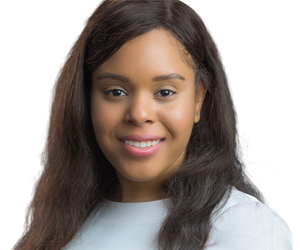
Kishauna Soljour holds a Ph.D. in history from Syracuse University. She is a dedicated and innovative educator, whose teaching and mentorship have impacted SDSU students and the broader community. Over the past three years, she has taught a range of large General Education courses to specialized graduate seminars reaching nearly 500 students across multiple semesters. She also champions public humanities. Her HUM 103 students developed a digital timeline project, six of whom presented at the Digital Humanities Symposium. She actively supports student research through the Weber Honors College Community Engagement Fellows Program, leading collaborations with the Museum of Contemporary Art San Diego and Old Town State Historic Park. Soljour’s teaching is anchored in real-world relevance, as evidenced by the recognition of one of her students, Day Parks, who was awarded the Diversity, Inclusion, and Social Justice Research Award for her project, “#EnvironmentalJusticeNow,” at the SDSU Student Symposium (S3). Beyond the classroom, Soljour mentors students across disciplines and contributes to access and equity through her work with the SDSU Valuing Incarcerated Scholars through Academia (VISTA) program at Centinela State Prison. Her dedication to research is exemplified by three NEH Summer Institute Fellowship Awards, two projects funded by the Mellon Foundation, and an Institute for Citizens & Scholars, Mellon Career Enhancement Fellowship for junior faculty.
Non-Tenure Track Faculty Award
Amanda Beardsley, Department of Women’s, Gender, and Sexuality Studies
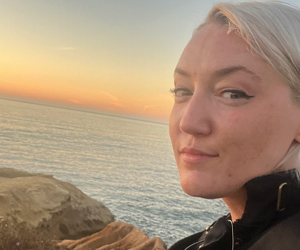
Amanda K. Beardsley is the Cayleff and Sakai Faculty Scholar at San Diego State University and received her Ph.D. in Art History from Binghamton University. Her research, alongside her passion for teaching and mentorship, has led her to develop courses on gender, science, and religion; art and medicine; sound studies and feminism; and art history. She is the co-editor of “Latter-day Saint Art: A Critical Reader” (Oxford University Press, 2024) and has published in Technology and Culture and Nineteenth Century Studies.
2023-2024
- Non-Tenure Track Faculty Award - Charlene E. Holkenbrink-Monk, Department of Sociology and James Murren, Department of Political Science
2022-2023
- Tenured/Tenure-Track Faculty Award - Stephen Goggin, Department of Political Science
- Non-Tenure Track Faculty Award - Ghassan Zakaria, Department of Linguistics and Asian/Middle Eastern Languages
2021-2022
- Tenured/Tenure-Track Faculty Award - Michael Domínguez, Department of Chicana-Chicano Studies
- Non-Tenure Track Faculty Award - Kristal Bivona, Behner Stiefel Center for Brazilian Studies
2020-2021
- Tenured/Tenure-Track Faculty Award - Kim Twist, Department of Political Science
- Non-Tenure Track Faculty Award - Carl Fielden, Department of Rhetoric and Writing Studies
2019-2020
- Tenured/Tenure-Track Faculty Award - Paula DeVos, Department of History
-
Non-Tenure Track Faculty Award - Jason Parker, Department of Rhetoric and Writing Studies
2018-2019
- Tenured/Tenure-Track Faculty Award - Jennifer Sheppard, Department of Rhetoric and Writing Studies
-
Non-Tenure Track Faculty Award - Michael Caldwell, Religious Studies and Classics and Humanities
2017-2018
- Tenured Faculty Award – Hisham Foad, Economics
- Non-Tenure Track Faculty Award - Steve Merriam, Rhetoric and Writing Studies
2016-2017
- Tenured Faculty Award – Eve Kornfeld, History
- Non-Tenure Track Faculty Award - Amy Wong, Sociology
2015-2016
- Tenured Faculty Award – Doreen Mattingly, Women's Studies
- Tenure-Track Faculty Award – Emily Schuckman-Matthews, European Studies
- Non-Tenure Track Faculty Award – Angela Feres, Religious Studies
2014-2015
- Tenured Faculty Award – Irene Lara, Women's Studies
- Tenure-Track Faculty Award – Paul Minifee, Rhetoric and Writing Studies
- Non-Tenure Track Faculty Award – Holly Ransom, European Studies
2013-2014
- Tenured Faculty Award - William Nericcio, English and Comparative Literature and Director, Master of Arts in Liberal Arts & Sciences
- Tenure-Track Faculty Award - Todd Braje, Anthropology
- Non-Tenure Track Faculty Award - Patricia Morgan, Rhetoric and Writing Studies
2011-2012
- Tenured Faculty Award – Jung Choi, Sociology
- Non-Tenure Track Faculty Award - Jeff Hay, History
Service
Awards are given annually: one for a tenure or tenure-track faculty and one for a lecturer. Recipients receive money in support of their professional activities and are selected based on: contributions of the faculty member to the department, the college, university, profession and/or community. CAL is particularly interested in recognizing those faculty members performing extraordinary service or service that is otherwise uncompensated by other measures.
Erika Robb Larkins, Department of Anthropology
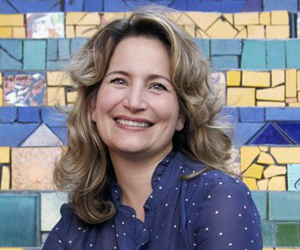
Erika Robb Larkins is a professor of anthropology, Behner Stiefel Brazilian Studies chair, and director of the Center for Brazilian Studies. She is the author of two books: “The Spectacular Favela: Violence in Modern Brazil” (University of California Press, 2015) and “The Sensation of Security: Private Guards and Social Order in Brazil” (Cornell University Press, 2023). She has also published on issues of race, gender, and politics in Brazil, with recent articles appearing in American Ethnologist, American Anthropologist, City and Society, and the Journal for Latin American and Caribbean Anthropology, and in public outlets including Al Jazeera, El País and Estadão.
Larkins is currently working on a National Science Foundation-funded research project on extreme heat and inequality in Rio de Janeiro and Imperial Valley, California. A second project, “Emergent Ecologies: Living with Environmental Transformation in Brazil” focuses on environmental racism in low-income communities in Rio de Janeiro and Bahia, examining how people are impacted by water pollution, changes to oceans and tides, and ongoing land and real estate speculation.
In 2024, in recognition of her scholarly and service contributions, the Rio de Janeiro City Council awarded her honorary Rio citizenship. Larkins is also president of the Brazilian Studies Association (BRASA).
Ricardo Vasconcelos, Department of Spanish and Portuguese
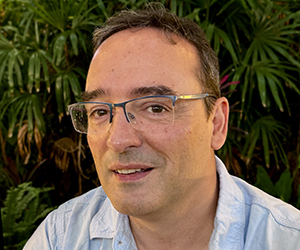
Ricardo Vasconcelos is a a professor of Portuguese and Brazilian literature and culture, as well as the Portuguese language. He finds joy in the classroom with students, reading a good book, and writing about it. He believes there is no better definition of happiness than being able to uncover profound meanings about humanity in literature, cinema, music, and the arts, and discovering them daily with students. Vasconcelos knows first-hand that the humanities and languages contribute to making the world better, not merely by teaching good feelings, but by providing insights into the world that no other instrument can.
Years ago, Vasconcelos changed his email signature to reflect that he is a first-generation college student, having traveled the path from B.A. to M.A. and Ph.D. While this may say little about him personally, it speaks volumes for the future of his students who may aspire to achieve more but are unsure how to proceed. In a time of radical technological challenges and opportunities, the direct relationship between professors and students is becoming increasingly crucial, and he invites others to engage in conversations with him and his colleagues.
Vasconcelos has published books and articles that some people read extensively, and others that he cherishes nonetheless. Most importantly, he feels privileged to engage in the intense work that all faculty at SDSU undertake — researching, teaching, and serving the university, their profession, and the local communities.
2023-2024
- Olivia Chilcote, Department of American Indian Studies
- Latha Varadarajan, Department of Political Science
2022-2023
- Clare Colquitt, Department of English and Comparative Literature
- Lashon Daley, Department of English and Comparative Literature
2021-2022
- Audrey Beck, Department of Sociology
- Michael Domínguez, Department of Chicana-Chicano Studies
- Isaac Ullah, Department of Anthropology
2020-2021
- Eve Kornfeld, Department of History
- Esther Rothblum, Department of Women's Studies
- Jamie Madden, Department of Rhetoric and Writing Studies
2019-2020
- Roberto Hernández, Department of Chicana-Chicano Studies
- Edith Benkov, Department of European Studies
- Deborah Poole, Department of Linguistics and Asian/Middle Eastern Languages
